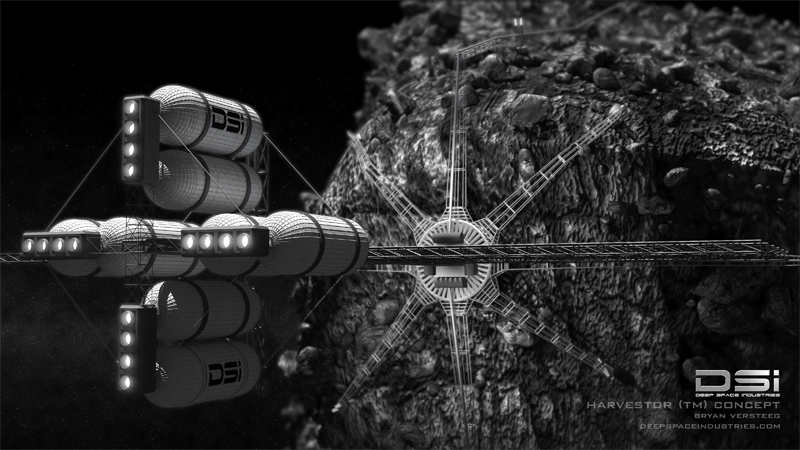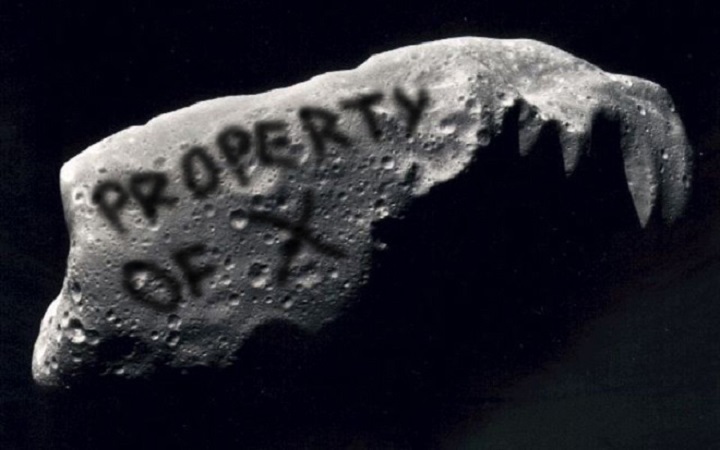
It's official. Companies that conduct mining on asteroids or other celestial bodies are now entitled to property rights, and will therefore be allowed to keep whatever they dig up. That is the substance of the Space Resource Exploration and Utilization Act of 2015 (aka. the SPACE Act) a bill that was recently passed by the US House of Representatives. The age of space prospecting has begun!
For many, such a bill could not have come soon enough. With the recent explosion in commercial aerospace companies - SpaceX, Virgin Galactic, and Bigelow Aerospace, just to name a few - there has been significant pressure to create a legal framework that would ensure that regulations and laws are in place once companies get out there. At the same time, several companies have emerged that have plans to conduct asteroid prospecting and mining, once the necessary infrastructure is in place.
These include Planetary Resources, a company founded by Peter Diamandis and Eric Anderson in 2010 with support provided by Larry Page, Eric Schmidt, and James Cameron. In April of 2012, the company announced plans to mine asteroids for their resources, as well as the creation of fuel depots in space by 2020. These depots would convert water extracted from asteroids into liquid oxygen and hydrogen for rocket fuel, which could then be shipped to Earth orbit for refueling commercial satellites or spacecraft.
Similarly, in 2013, David Gump (the founder of Transformational Space Corp. and Astrobotic Technology Inc.) announced the creation of an asteroid mining company known as Deep Space Industries. According to Gump's plan, the company would begin prospecting for asteroids in 2015, begin returning samples to Earth by 2016, and mining asteroids by 2023. Intrinsic to all this is a proprietary technology called the "MicroGravity Foundry" - a 3D printer that transforms raw asteroid material into complex metal parts.
And now, with the passage of the SPACE Act, the first legal issue - the right of ownership - has been established. As the bill states: "Any asteroid resources obtained in outer space are the property of the entity that obtained such resources, which shall be entitled to all property rights thereto, consistent with applicable provisions of Federal law."
Naturally, the bill also raises some important questions, which will no doubt be the basis of future legislation. These include, but are not restricted to, the issue of who will be responsible for regulating space activity, and which rules will apply.
As it stands, responsibility over space propsecting and mining is likely to end up with the Federal Aviation Authority (FAA), which is currently responsible for issuing licenses for commercial space launches. It would not be difficult to imagine that in the near future, FAA authority would also involve assigning licenses for asteroids, as well as the right to ship resources in space.
Another issue is how this bill may impact upon existing space law. For instance, the Outer Space Treaty of 1967 states that crewed vehicles are entitled to operate within a 200 km (125 mile) "non-interference" zone designed to keep astronauts safe. If the same standard were applied to commercial space operations on lunar or other extraterrestrial bodies, then zones of jurisdiction are likely to be rather large and exclusive.

Founded in 2013, Deep Space Industries plans to begin asteroid mining by 2023. Credit: deepspaceindustries.com
Similarly, the treaty states that "the exploration and use of outer space shall be carried out for the benefit and in the interests of all countries and shall be the province of all mankind." While some individuals claim that these articles do not pertain to private citizens or corporations (such as Dennis Hope of the Lunar Embassy Corporation, a company that sells land deeds to extraterrestrial bodies), the spirit of the law is clear.
Also, there have been attempts to rectify the ambiguities of the Outer Space Treaty, the most notable of which is the Moon Treaty. This agreement, which was drafted by the UN General Assembly in 1979, specifically bans private ownership over the Moon and other celestial bodies. However, at present, the treaty has only been ratified by 16 nations, none of which are involved in self-launched manned space exploration, and therefore has little bearing on commercial space exploration.
But of course, these and other considerations are likely to be ironed out with time. And as prospecting and mining operations begin in earnest, we can expect that the governments of Earth will move quickly to address whatever conflicts emerge. In the end, all we can do is hope that the law keeps pace with the rate of development, so that the "final frontier" doesn't become a lawless mess like its predecessors!
Got ideas that could change the world and make for a better future? Then head on over to the Launch your Challenge page and be prepared to make a difference!
Top Image Credit: wired.com








